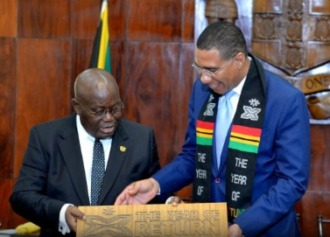
Although these efforts are impressive compared to most of Jamaica’s neighbors, they only scratch the surface of what is possible in the country. Jamaica’s current matrix of renewable power plants comprises only 7.8 percent of total installed generation capacity. New research suggests that, by further developing its diverse renewable resource endowment of solar, wind, hydro, and biomass, the country can comfortably meet 40 percent of its total anticipated electricity demand by 2027.
Jamaica’s mandate to do so has never been stronger. The country currently sources 95 percent of its electricity use from petroleum-based power plants. Because Jamaica lacks domestic petroleum resources, it depends entirely on imports, resulting in significant economic and environmental costs for the country. Currently, Jamaica spends 9 percent of its GDP (or $1.3 billion annually) on petroleum imports, which contributes substantially to the country’s prolonged negative trade balance.
Like many of its Caribbean neighbors, Jamaica relies on the Petrocaribe agreement with Venezuela to secure petroleum for its power system on favorable terms. Although this agreement has sheltered Jamaica from international oil market volatility, it also has gradually eroded the country’s financial autonomy. The International Monetary Fund estimated that, as of 2015, Jamaica’s sole electricity provider, the Jamaica Public Service Company (JPS), owed Venezuela $2.4 billion in debt, an amount equivalent to more than 17 percent of Jamaica’s GDP.
The knock-on effects of this debt reflect a grim outlook for fossil fuel-based generation in Jamaica. Servicing the debt owed for imported fossil fuels means that fewer resources are left for JPS to invest in grid infrastructure improvements. As a result, Jamaica’s antiquated grid is plagued by high transmission and distribution losses that are consistently near 20 percent. Because of this inefficiency, far more electricity is produced than is ever consumed in Jamaica, burdening JPS with additional, unnecessary costs.
Read the full story at cleantechnica.com


